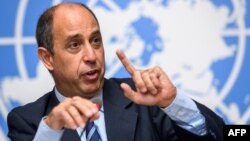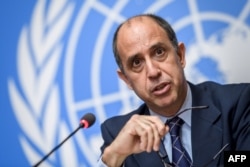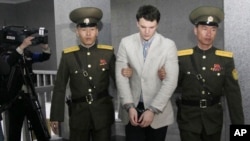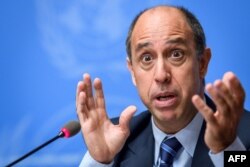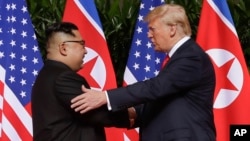Concerned by the lack of any reference to human rights in the joint statement issued at the historic summit between Washington and Pyongyang, the United Nations special rapporteur on North Korea says “this is the time” for the U.S. to pressure North Korean leader Kim Jong Un to engage in a dialogue with the international community to improve the lives of North Korea’s people.
“Any reference to human rights … was absent,” said Tomás Ojea Quintana, special rapporteur on North Korea for the United Nations based in Argentina. “The only term in the joint statement that I could associate with human rights is the word ‘prosperity’ where the two leaders [agreed to] commit to peace and prosperity and security in the Korean Peninsula.”
The joint statement issued by Trump and Kim at the summit Tuesday on Singapore’s Sentosa Island, contained four stipulations: “Washington and Pyongyang agreed to normalize the relations between the two countries and pursue peace on the Korean Peninsula, affirmed North Korea’s commitment toward complete denuclearization, and decided to recover and repatriate the remains of the POWs and MIAs during the Korean War.”
But it lacked any mention of North Korea taking action to address its human rights situation.
Quintana said the momentum generated by the summit must bring North Korea’s human rights situations to the fore.
“This is the time. This is the time,” he said. “Now the North Korean leadership and the government want to normalize the country, want to become a respectable member of the United Nations. Well, they will have to change their stance in regard to human rights questions and start the process of dialogue and engagement.”
Trump priority: denuclearization
While Quintana said he understands President Donald Trump’s priority is denuclearizing North Korea, the U.N. official is concerned that unless the human rights situation in North Korea improves, it will become “an obstacle for any agreement to be implemented and effective.”
During a press conference after the summit talks, Trump downplayed reporters’ questions on human rights, saying only that he brought up the issue to Kim.
When VOA’s Greta Van Susteren asked Trump about human rights in an interview right after the summit, Trump replied “human rights were mentioned” during the discussion on denuclearization. Touting Kim as someone who “loves his people,” Trump said, “Look, he’s doing what he’s seen done,” when Susteren underlined the regime’s brutality against its people.
Marked change of tone
Trump’s comments after the summit showed a marked change from his State of the Union address in January when he said, “no regime has oppressed its own citizens more totally or brutally than the cruel dictatorship in North Korea.” He cited the shameful trial of American college student Otto Warmbier who was detained in North Korea and “horribly injured” before he died days after his return to the U.S. And Trump described the saga of North Korean defector Ji Seong-ho who, during his search for food, lost a leg before escaping on crutches.
“Today he lives in Seoul,” Trump said, “where he rescues other defectors, and broadcasts into North Korea what the regime fears the most — the truth.”
Hoped for opportunity
Quintana, who “reports on the situation of human rights in North Korea and on the government’s compliance with its obligation under the international human rights law,” had hoped the summit would open up an opportunity to evaluate conditions in North Korea.
Instead, “I don’t see a strategy to effectively assess the problem of a serious human rights situation on the ground in North Korea,” said Quintana. “In this regard, I am concerned.”
Quintana said the U.S. delegations to the U.N. in Geneva and in New York, his two formal channels of communication with U.S. officials, had stressed to him that human rights remain a concern and “will be included with any engagement with North Korea.”
He said, “How did the dynamics unfold in the context of the summit and the leaders that might be something different.”
Quintana also continues to seek official communication with North Korean authorities to discuss human rights, but because North Korea denies allegations of human rights violations and opposes on-the-ground investigations, the U.N. special rapporteur has to assess the situation through civil organizations in South Korea or through people who defected the North.
“The government of North Korea stated the human rights issue has been used politically by different states,” Quintana said. “In their case, [a] double standard was applied. These are the kind of arguments that the North Korean government presents to oppose any negotiations or engagements or conversations with me, with my mandate.”
Report to UN
In his “Report of the Special Rapporteur on the Situation of Human Right in the Democratic People’s Republic of Korea” made to the U.N. Human Rights Council in March 2018, Quintana describes some of the conditions of detainees in political prison camps.
A female detainee in one of the labor camps, known as kyohwaso, run by North Korea’s Ministry of State Security and the Ministry of People’s Security is quoted in the report on the difficulties of gaining access to basic necessities such as water: “The heads of cells, inmates selected by prison officials according to the extent to which they have a clean record … could wash, not the rest of us.”
Another woman who was detained after being repatriated to North Korea from China said, “You can’t imagine if you haven’t experienced it. We were treated like animals, given only corn to eat or a poorly made soup of dried radish greens.” She continued, “The toilet is located inside a room that hosted a dozen of people. You’re not allowed to move. … If you move, they beat you.”
North Korea’s regime could begin to address the economic and cultural rights of its people as an entry point of addressing human rights, if sanctions are relaxed and Pyongyang starts receiving economic support, Quintana said.
If “North Korean authorities open up … to the system of the United Nations,” Quintanna said it would be a “very good sign of credibility, reliability from North Korea” that would say that, ‘We are ready to open up our frontiers. We are ready to start conversations, to have human rights dialogue which has been absent for many, many years.’”
Human rights dialogue
Quintana expects the U.S., as well as South Korea, China and Russia, to encourage and urge the leadership of North Korea to engage on a human rights dialogue, which he said will be “a very important step forward” that “will go in parallel to the negotiations on peace, security, and denuclearization.”
“There is a need of a … concrete political decision from North Korea at this juncture,” Quintana said. “From President Trump’s press conference … he said Mr. Kim Jong Un … is willing to do something … Kim Jong Un cares about the people and willing to show something in regard to the people. I hope that’s connected to human rights dialogue.”




